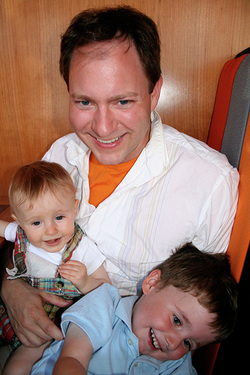Being a father is my toughest and most important job. Most of our social problems can be traced to absent and unloving fathers. According to research, involved and loving fathers have children with higher academic and economic achievement, better psychological well-being, more overall life satisfaction, higher self-acceptance and social competence, more tolerant and understanding and less substance abuse and drinking. In Gen. 27, you see this research confirmed through the family of Isaac.
When Isaac was old and couldn’t see, he told his older son, Esau, to hunt game and prepare a savory dish so he could bless him. Rebekah, Isaac’s wife, overheard the conversation and asked the younger son, Jacob, to deceive his father by preparing food so Isaac would think it came from Esau (Gen. 27:1-10). You learn deception and lying from the poor example of parents who show favoritism.
Jacob said to his mother that his father might figure out the deception leading to a curse and not a blessing. Rebekah responded, “Your curse be on me, only obey my voice and get them for me.” She took Esau’s best garments to put on Jacob and gave him savory food and bread to present to Jacob (Gen. 27:12-17).
Isaac wondered how he got it so quickly. Isaac said, “Because the Lord your God caused it to happen to me.” When he smelled his garments, he blessed Jacob instead of Esau. Isaac said his smell was like the field the Lord had blessed. He blessed Jacob with a comprehensive blessing:
1. Give him God’s dwelling place (dew of heaven)
2. Give him physical earth with land and people
3. Provide abundance of grain & new wine
4. Allow people to serve him
5. Enable nations to bow down to him
6. Become master over his brothers so they bow down to him
7. Curse (render powerless to resist) those who curse him and bless those who favor him (Gen. 27:27-29). Blessing our children assure their success, ability to get along with others and to develop an intimate relationship with God.
When Esau presented his savory food and Isaac learned it was him, he trembled violently. Esau cried out with a exceedingly great and bitter cry, “Bless me, even me also, O my father! . . . Jacob took away my birthright, and behold, now he has taken away my blessing. Have you not reserved a blessing for me?” When children experience injustice, they respond with deep hurt, fear, and and anxiety.
Isaac said to Esau, “Behold, I made him your master and all his relatives I have given as servants and with grain and new wine I have sustained him. What can I do, my son?” (Gen. 27:30-38). Fathers experience a deep emotional reaction when they face the consequences of showing favoritism or taking advantage of their children.
Isaac said to Esau: “Away from the fertility of the earth shall be your dwelling, and away from the dew of heaven from above. And by your sword you shall live, and your brother you shall serve; but it shall come about when you become restless, that you shall break his yoke from your neck.” (Gen. 27:39-40). Cursing your children accomplishes just the opposite of blessing where you assure their failure, inability to get along with others and distant relationship with God.
Esau bore a grudge and sought to kill Jacob because their father blessed him instead. To protect her son, Jacob, from Esau, Rebekah told him to flee to Haran where her brother, Laban, lived. She told Isaac that she was tired of living if Jacob married a daughter of Heth (Gen. 27:41-46). Family relationships produce strong emotions of deep hurt and trauma that must be overcome through blessing, praise and favor shown toward your children.
Fathers must identify and be fully aware what their children are experiencing so they don’t feel slighted or taken advantage. Paul commanded fathers to not provoke their children to anger, that they may not lose heart (Col. 3:21).
Ask God how you can bless your children practically through encouragement and availability.







